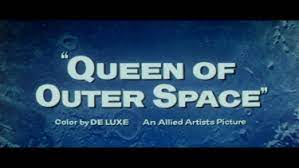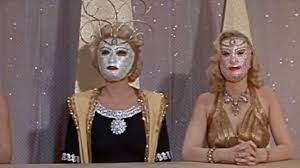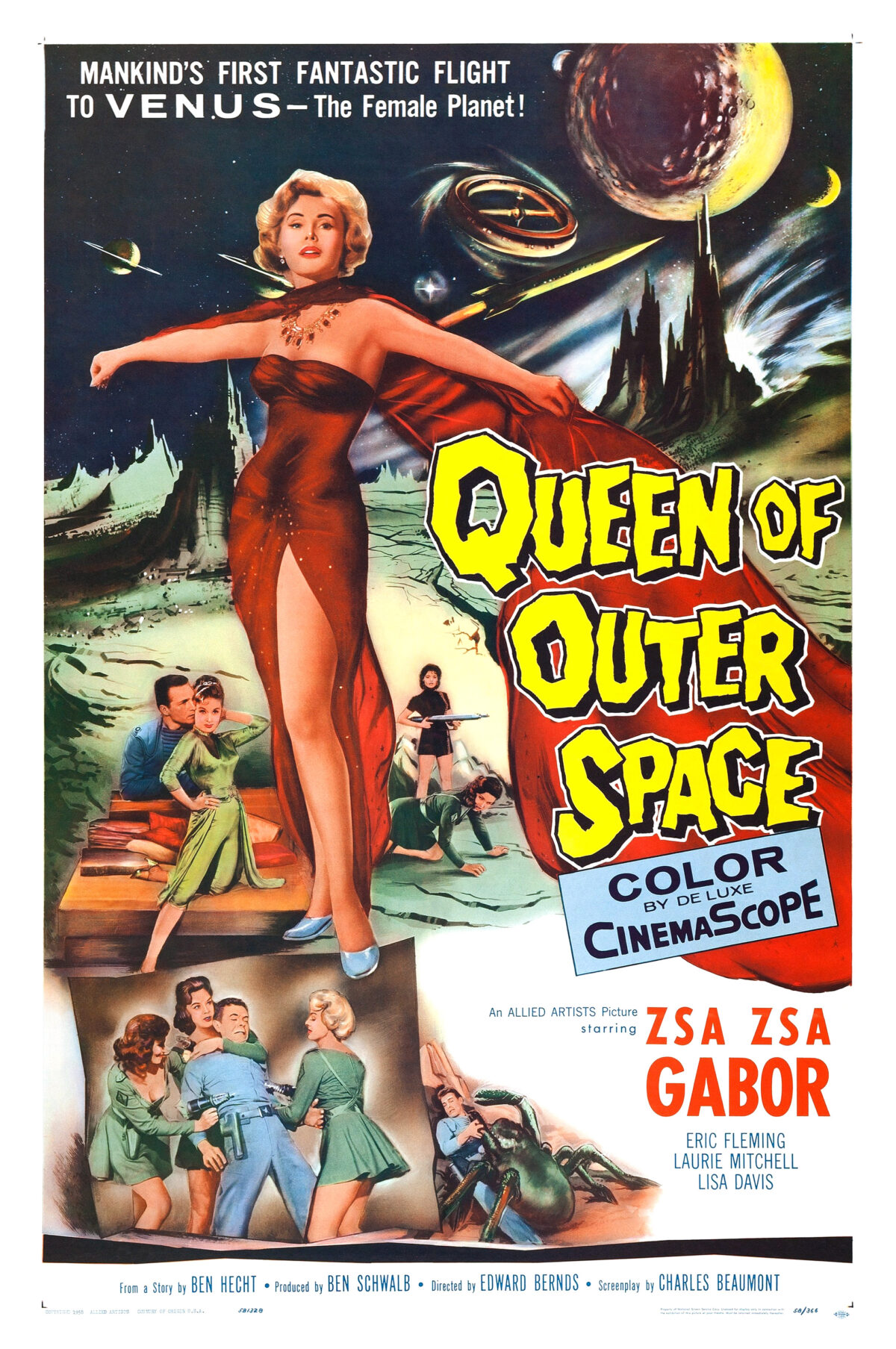IMDb meta-data is runtime of 1 hour and 20 minutes, rated 4.6 by 2,200 cinematizens.
Genre: SyFy; Species: women without men.
Verdict: A Golden Raspberry.

The usual crew (square-jawed captain, drooling comic relief, and oily Romeo) set off on a mission in a NASA launch film clip. Along for the ride (on the hospital bed that seems to be standard equipment on the flight deck*) is Paul Birch, holder of the Order of Sy Fyist Premier Cru for his many contributions to the genre, excluding this one. The mission is to deliver milk to the orbiting space wheel from Conquest of Space (1955).
Drooler is too busy memorising his gag-lines to notice as they veer off course and land on Venus in a snowfield. (This footage, too, comes from another film – Mission to Mars [1953]). When they come across a road sign directing them to Venus City, they realise all that the textbooks about the second planet are all wrong.
It gets worse. It is a planet without men! (Note, Venusians have had this problem before, watch for a forthcoming review of the Ship of Monsters (1960) for enlightenment on this recurrent problem.) This occasions so many stupid remarks that they are impossible to list, and better passed in silence. Suffice it to say that the dialogue is so sexist and misogynist that some critics suppose it was meant to be satire. I wish, but I don’t think so. In any event, it is all consistent and all played straight. The women are decked out in short, short skirts and high, high heels, and so on and on.
In such a shoddy production with such cement-direction that it takes 15-minutes to get going it is surely presumptuous to ridicule anyone else, but there it is. All the costumes and props look familiar because they had been used in previous movies, like the grey on gray uniforms from Forbidden Planet (1956), like the ray guns from Missile to the Moon (1958), like the (miniature) rubber spider from Cat Women of the Moon (1953), like the women’s costumes from World without End (1956), and the list goes on. Likewise the orienting shots, the snowfield landing, the city in the distance, the cosmos, the space station wheel, the initial rocket launch all come from other movies and no effort is made to conceal, integrate, or explain the obvious discrepancies in size, scale, or colour.

One might think this is bad but there is more. Hang onto those steak knives.
It fails the elementary Bechdel Test on criterion #3. The planet may have only women but they talk only of men. On this test…, well, look it up.
All in all, in comparison it makes Quark (1977) look like a quality production with a thoughtful script and convincing acting. (Psst, if you haven’t seen Quark, don’t!)
The inner pedant requires that I say the lead is not the queen, and the queen is on Venus not in Outer Space.
It is hard to believe that this concoction represents the combined creative efforts of Charles Beaumont, Ben Hecht, and Edward Bernds, who each have many other, far superior credits before and after this movie. Beaumont wrote some real chillers like The 7 Faces of Dr Lao (1964) and many episodes of the Twilight Zone. Ben Hecht created Hildy in His Girl Friday (1940) as well as writing Notorious (1946), Walk on the Wild Side (1962), and scores of others. Bernds specialised in short comedy as a director, writer, and designer with hundreds of credits. None of that pool of talent is visible in this widescreen, technicolor release, which looks like an A-movie and plays like a D-movie, those made to go directly to the drive-in theatre screens.
Women without men is a niche market that is well served by film producers with arrested development. It seems to be a frat boy fantasy that somewhere, somehow there are gorgeous women so starved of men that the frat boy will look good. Dream on, Bro. Here is a list of some to prove the point:
Jungle Women (1944)
Captive Women (1952)
Untamed Women (1952)
Cat-Women of the Moon (1953)
Mesa of the Lost Women (1953)
Women’s Prison (1955)
Fire Maidens from Outer Space (1956)
Missile to the Moon (1958)
Wild Women of Wongo (1958)
Women of the Prehistoric Planet (1966)
Mars Needs Women (1966)
Voyage to the Planet of Prehistoric Women (1968)
Chain Gang Women (1971)
No doubt there are others. Some of these are superior to the film under consideration and most do not take themselves as seriously.
- The bed is there because there was no fourth recliner seat in any other science fiction movie to borrow so the bed was wheeled in from the studio infirmary. Most of the budget went to the leading lady’s salary, leaving little or nothing for the props and costumes. These insights are from the gossip about the backstage of the film on the IMDb.

